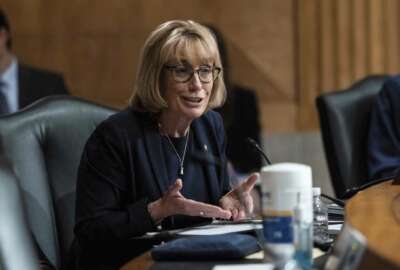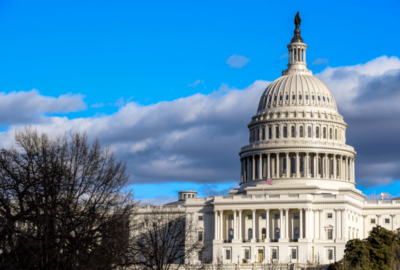DoD IG recognizes whistleblower for hotline tip that led to $25M settlement
A call made in August 2014 led to the Justice Department reaching a $25 million False Claims Act settlement with a Boeing subsidiary earlier this year that...
The Defense Department inspector general’s office receives about 10,000 calls to its whistleblower hotline every year.
One of those calls, made in August 2014, led to the Justice Department earlier this year reaching a $25 million False Claims Act settlement with a Boeing subsidiary that allegedly sold used and refurbished drone parts to the Navy and Special Operations Command (SOCOM) for the price of new materials.
As part of the settlement announcement, DoJ in January claimed the vendor Insitu “knowingly induced the government” to award it seven, noncompetitively bid contracts “at inflated prices,” by submitting cost and pricing data for new materials, but instead used less expensive recycled and refurbished parts to fulfill the contracts.
Former Insitu executive D.R. O’Hara, the whistleblower who first called the DoD IG hotline seven years ago, claims the vendor also resold parts that the Navy and SOCOM had already purchased.
“Finance was invoicing full price for this used, already owned equipment, much of this already owned by the U.S. government because they’d already paid for it earlier,” O’Hara said Thursday during a National Whistleblower Day event hosted by the DoD OIG.
Acting DoD IG Sean O’Donnell, recognizing O’Hara as his office’s whistleblower of the year, said hotlines remain a vital lifeline for whistleblowers to report fraud, waste, abuse and misconduct to agencies, but only if whistleblowers receive an assurance of confidentiality.
“Whistleblowers are an important part of our work. In fact, they are in a way partners in our work. They provide information and details related to alleged wrongdoing, that IGs might not learn otherwise. Protecting the identity of whistleblowers who wish to remain anonymous, or confidential, therefore encourages future reporting,” O’Donnell said.
While few hotline tips result in settlements this large, Jeff Dolan, an investigative analyst with the Defense Criminal Investigative Service, the criminal investigative component of the DoD OIG, said his office has seen a steady increase in the number of cases stemming from hotline tips.
“Tips are one of the best sources of detecting fraud and other criminal activities, and hotlines are a wonderful way for us to capture these tips,” Dolan said.
The DoD IG hotline, however, wasn’t the first place O’Hara went to address his concerns. He said he alerted Insitu executive staff in December 2013, and by January 2014 was demoted.
Feeling “ostracized” for his actions, O’Hara said he reported his concerns to a Boeing ethics hotline, which then contacted human resources at Insitu. O’Hara claims the Boeing ethics hotline violated its own policy by disclosing his identity to HR.
“When it goes to HR, you’re headed out the door,” O’Hara said. Insitu fired him in November 2014.
Spokespeople for Boeing and Insitu declined to comment.
Shanna Devine, director of the Office of the Whistleblower Ombuds, said building trust in whistleblowers remains critical, especially in the aftermath of Congress spending trillions of dollars because of COVID-19.
Rep. Jackie Speier (D-Calif.), the co-chair of the House Whistleblower Protection Caucus, speaking Friday at an event hosted by the National Whistleblower Center, urged Congress to pass stronger whistleblower protection, especially given the scope of pandemic stimulus spending
“Over a year into the COVID-19 pandemic, we have seen time and time again that whistleblowers serve as the moral compass for our country,” Speier said.
The COVID-19 Whistleblower Protection Act she introduced along with Rep. Jamie Raskin (D-Md.) and Sen. Elizabeth Warren (D-Mass.) would strengthen anti-retaliation protections for employees and former employees of businesses that received COVID-19 relief funds.
Spier also introduced the Whistleblower Protection Improvement Act in May, which prevents agencies from retaliating against federal employees who share information with Congress. Federal whistleblowers under this bill would also be able to pursue their cases in federal district court.
House Oversight and Reform Committee Chairwoman Carolyn Maloney (D-N.Y.), and Reps. Gerry Connolly (D-Va.) Nancy Mace (R-S.C.) also introduced the Whistleblower Protection Improvement Act
But Devine, whose office advises the House on best practices for working with whistleblowers, said whistleblowers often find themselves at a “personal and professional crossroads” in the moments before reporting their concerns.
“These individuals are often treated as if they have committed a crime for exposing a crime, and all of these factors invariably are going to amount to significant forms of psychological, emotional, and financial stress and impacts. But importantly, they’re trying to act on this critical life choice by working effectively with you, and for them to take that step, they need to have confidence in the process,” Devine said.
O’Hara said both inspectors general and whistleblowers face challenges in working together to turn a complaint into a full-fledged investigation.
“It takes some courage to stand up and be counted, but on your side, it also takes some fortitude to stay with it and try to accept the complaints as they come in,” O’Hara said.
Because whistleblowers are often insiders at organizations accused of wrongdoing, O’Donnell said they often feel concerned about retaliation for coming forward with allegations.
“They are in a way models of integrity, choosing to do right when it would have been just as easy, maybe easier to do nothing. And they have chosen to do what is right, often in the face of tremendous pressure.”
O’Hara received $4.6 million of the recovered funds part of the qui tam provision of the False Claims Act, but spent several years and close to half a million dollars on his legal defense overall.
“I didn’t know there was any share ratio that went with this, it was simply the company was defrauding all of us, and it was just base wrong,” O’Hara said.
Despite the major scope of the settlement, O’Hara said the financial impact of the alleged fraud well exceeded the $25 million settlement.
“The settlement is a small slice of that, and sometimes it’s best to just settle it,” O’Hara said.
Copyright © 2025 Federal News Network. All rights reserved. This website is not intended for users located within the European Economic Area.
Jory Heckman is a reporter at Federal News Network covering U.S. Postal Service, IRS, big data and technology issues.
Follow @jheckmanWFED






